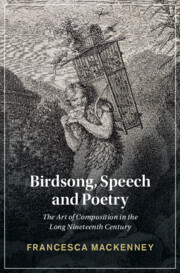Book contents
- Birdsong, Speech and Poetry
- Cambridge Studies In Nineteenth-Century Literature And Culture
- Birdsong, Speech and Poetry
- Copyright page
- Dedication
- Contents
- Figures
- Acknowledgements
- Introduction
- Chapter 1 The Science of Birdsong
- Chapter 2 The Science of Language:
- Chapter 3 ‘Prelusive Notes’
- Chapter 4 ‘Undersong’
- Chapter 5 ‘We Teach ’Em Airs That Way’
- Conclusion
- Notes
- Bibliography
- Index
- Cambridge Studies In Nineteenth-Century Literature And Culture
Chapter 2 - The Science of Language:
1755–1873
Published online by Cambridge University Press: 15 September 2022
- Birdsong, Speech and Poetry
- Cambridge Studies In Nineteenth-Century Literature And Culture
- Birdsong, Speech and Poetry
- Copyright page
- Dedication
- Contents
- Figures
- Acknowledgements
- Introduction
- Chapter 1 The Science of Birdsong
- Chapter 2 The Science of Language:
- Chapter 3 ‘Prelusive Notes’
- Chapter 4 ‘Undersong’
- Chapter 5 ‘We Teach ’Em Airs That Way’
- Conclusion
- Notes
- Bibliography
- Index
- Cambridge Studies In Nineteenth-Century Literature And Culture
Summary
Chapter two delineates ‘the science of language’ as it developed from the philosophical speculations of Jean-Jacques Rousseau and Johann Gottfried Herder to the establishment of the ‘New Philology’ in the 1860s. Even as philosophers recognised significant continuities between birdsong, speech and poetry, they also, however, increasingly turned their attention to the internal, mental faculties as the distinguishing marks of an evolved and uniquely human language. This chapter examines the wider implications of a developing equation of language and thought in the long nineteenth century. The apparent absence of language in animals was widely seen to reflect a lack of intelligence, reason or even consciousness. Since language reflected the unique faculties of the human mind, philosophers of all stripes raced to discover an intrinsic set of principles common to all human languages throughout time and across continents. According to this same principle, however, differences between languages were also seen to reflect or even determine differences in the minds of their speakers. As they responded to these larger debates, scientists and poets throughout this period, from William Wordsworth to Charles Darwin, reflected on their personal experiences and the notorious difficulty they habitually encountered in attempting to translate their own thoughts into words.
Keywords
- Type
- Chapter
- Information
- Birdsong, Speech and PoetryThe Art of Composition in the Long Nineteenth Century, pp. 38 - 59Publisher: Cambridge University PressPrint publication year: 2022

